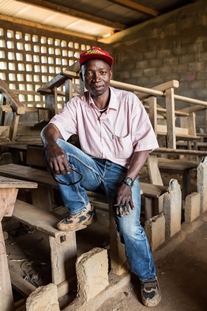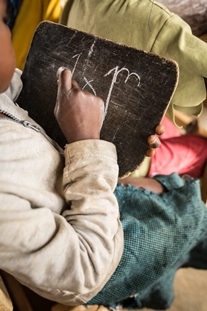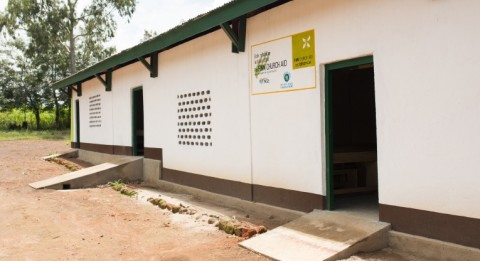From a hail of bullets to school: story of Yadbert from Central African Republic
There is still palpable restlessness in conflict-torn Central African Republic. “Education is the key to everything. Through it, we can make Central Africans work together”, says Fielbert, teacher who saved his village from violence.
Last December, 19-year-old’s Claude-Flaurentin’s father was shot in the leg. It happened when the villagers of Wantiguera were hiding from the Seleka forces in their village’s church in Bouar region, near the western border of Central African Republic.
“Women and children were inside the church, men were in the church yard. The hiding lasted from January to February”, says Claude-Flaurentin and looks straight in the eyes.
For over a month, 625 people lived crammed into an area smaller than a football field. The church is located near the main road, along which the ousted Seleka fighters retreated at the turn of the year. There were shots fired from the retreating trucks and pick-ups at everything in sight. Church provided the best shelter, as it was the largest and strongest building in the village.
“My father is a farmer. He was already sick. I am now very worried about my future, since my father cannot support me or my future family. I must get a proper occupation. I could become a teacher for example, so it is very important for me to finish school”, Claude-Flaurent says.
He still has five more years of school left.
Negotiating with the Seleka

Teacher Fielbert negotiated with the Seleka at the beginning of the year so that the village of Wantiguera would be spared of the violence. Finn Church Aid has just finished repairing the village’s primary school. The secondary school is still waiting to be repaired. ”Education is the key to everything”, Fielbert says.
Claude-Flaurentin’s father was the only one wounded in the village Wantiguera.
It could have been a lot worse.
The village is located near a military base. Even though the violence is mostly concentrated in the eastern parts of the country, locals view Wantiguera as possible combat area because of the military base. This made the locals flee in December to a vast unpopulated area of savannah and rainforest.
In the beginning of the year, the village leader decided, along with his son Fielbert, to negotiate with the local Seleka leaders. They asked that the village would be spared of violence.
“Seleka agreed on the grounds that I made a promise that none of the village’s youth joins the Anti-Balaka fighters, who are fighting Seleka”, says Fielbert, who works as a teacher.
The Seleka fighters who shot Claude-Flaurentin’s father came from Bangui and didn’t know about the agreement, he says. There are dozens of bullet holes in the brick wall surrounding the church. The holes in the church have just been repaired.
A month hiding in a church with mother
When the Seleka cars approached the church in January, the women and children inside threw themselves to the ground, hands covering heads.
One of them was Yadbert, 13. He was hiding in the church through January and February. At the end of last year, he was hiding in the savannah along with the rest of the villagers. 19-year-old Claude-Flaurentin calls Yadbert his brother.
Yadbert’s mother works in the fields and is therefore often away for days and nights. Fielbert looks after Yadbert when his mother is away. He also helps Yadbert. It is common in Central African Republic that family includes even distant relatives or for example neighbours. “Mom could not go to the fields then. We lived together in the church”, Yadbert says.
All schoolmates did not return
It has now been five months since the hiding. Sun is shining in the village filled with clay brick houses. A scent of burned smoke and plastic lingers in the air. Maize and banana grows in the yards. Most of the villagers are children and youth, and there are more curious children peeking behind every hut. The atmosphere is convivial.
Yadbert is preparing for the final exams of the year. Oral exams are now over, this week still has written exams on mathematics, French language, geography, history and civics. “Exams have gone well so far. Next exams are making me nervous, but I think I can handle them too” Yadbert says.
He came back to school in the end of March, when the schools were reopened after three months. “There were more of us before. Six of my friends have come back. I know twenty who have not yet returned.”
”My favorite subjects are history and geography”, he says sitting under a grassroof hut. Perhaps the best thing however is fixing Fielbert’s moped in the afternoons after school.
Finn Church Aid repaired Wantiguera’s school
When Yadbert came back to school in March, the building’s roof had nearly collapsed, and some of the desks were missing. Finn Church Aid repaired the school during the summer.
The roof was fixed, the building was painted inside and out, and new desks were bought. Separate toilets for girls and for boys were also built in the vicinity of the school.
“The new school is beautiful, not like the old one, which was really ugly. It’s much nicer to go to school now that they have new things” Yadbert says.
According to Fielbert, the new school is very important to the whole community. “First positive thing was that the government restarted the school year in the end of February. However, it was even more important to us when Finn Church Aid repaired the dilapidated school.”
“It’s sign that the peace will last here. Otherwise there would be no point in building or repairing things”, Fielbert says.
“Also, the school is something that is visible to nearly everywhere in the village and it belongs to everybody. That creates sense of community.”
“Those not attending school are more easily manipulated”

The end of the year exams are underway in the first grades of the school repaired by FCA. Today is the turn for the written exams on mathematics and French language. Most of the children do not have paper, so the exams are done on chalk boards.
The biggest challenge right now is getting all the children to return to school, according to the teacher Fielbert. Schools have a bad reputation, because both the Seleka and the Anti-balaka used them as bases. On the other hand, few months’ flight has worsened the financial situation of many families. Some of the school aged children have had to stay home and help their parents.
There are a lot of them who are still on the run. There are 280 families in the village. Approximately 100 youth don’t attend school. The number has risen since the end of last year, and after the violence this year.
”The problem is that those who don’t attend school are more easily manipulated into violence, theft and also to extremist groups” Fielbert says.
“Education is the key to all development. Without it, this country will not develop. The futures of the children are open here. Adults should give them all the possible support and be available to them”, he emphasises.
Going to school is important for the future also to Yadbert, even though he’s not sure what he wants to be when he’s grown-up. “If I don’t become a mechanic, it’s ok. I can also be a farmer. But farmers also need skills which are taught in school.”
For security reasons, all the people featured in the article are by their first names only.
Text: Satu Helin
Photos: Ville Asikainen
Finn Church Aid works in Central African Republic
• Finn Church Aid opened seven repaired schools in August in Bouar region in Central African Republic. The schools have approximately 3000 pupils combined.
• There are two school complexes opened in the capital of Bangui, mainly aimed for internally displaced people. They have nearly 3000 pupils combined.
• The aim is to repair approximately 60 schools by end of April 2015.
